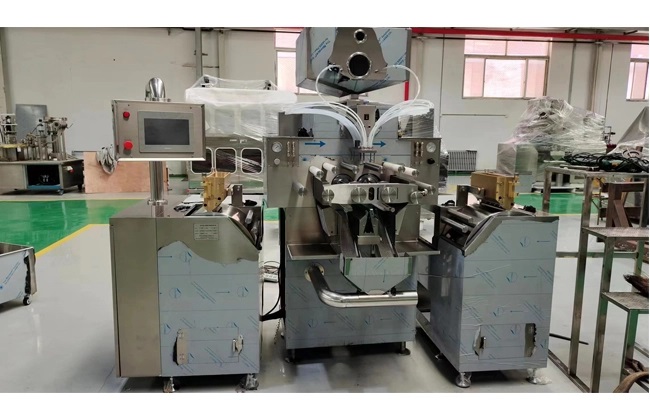
The soft gelatin capsules machine is a crucial first step in capsule manufacturing. To ensure smooth and orderly production, it is important to pay attention to certain operational knowledge and techniques during the use of soft gelatin capsules equipment. Below are some essential operating tips for commonly used soft gelatin capsules machinery.
Can the Equipment Produce High Viscosity Products
It is important to determine whether the equipment can produce high-viscosity products. High-viscosity, thick liquids are easier to compress and can even be used for paste-like materials. The spray nozzle design uses a rectangular direct spray, making the capsule formation more aesthetically pleasing. Additionally, reducing the spray speed can minimize liquid leakage. This is particularly important when producing high-viscosity products with the soft gelatin capsules machine.
Heating System in the Hopper Should Be Regularly Checked
Depending on the process requirements, the ground feed barrel and hopper are designed with efficient insulation. Gelatin boxes and other components are equipped with efficient insulation and automatic electric heating systems for constant temperature control. The heating system of the soft gelatin capsules machine should be regularly checked to ensure precise temperature control, thus ensuring production quality.
Gelatin Supply and Feeding System
The machine adopts an automatic gelatin and feeding system, reducing labor intensity and improving the work environment, which better complies with GMP requirements. The feeding system design should ensure continuous and stable feeding to the capsule mold, preventing production issues due to unstable feeding.
Mixer and Liquid Level Control in the Hopper
Regarding the mixer and liquid level control in the hopper, the liquid tank mixer uses a spiral mixing paddle. There are two types of liquid level measurement and control: one uses a float ball sensor, which is suitable for materials with good fluidity, and the other uses a capacitive column sensor that measures liquid levels based on the conductivity of the liquid, ideal for more viscous materials. The mixer design of the soft gelatin capsules machine should be adjusted according to the characteristics of the material.
Types of Lubrication Oil Systems for the Equipment and Rolling Mold
The lubrication of the rubber and rolling mold uses micro-oil supply technology, allowing the lubrication oil quantity to be adjusted according to needs. This minimizes lubrication oil consumption, reducing the amount of liquid paraffin on the rubber surface during production, which makes cleaning easier. The lubrication system of the soft gelatin capsules machine directly affects the efficiency and lifespan of the equipment.
Types of Conveyor Belts
The conveyor belt at the discharge outlet is controlled by PLC for automatic speed adjustment. It uses a 316L stainless steel mesh belt to ensure smooth transportation and packaging of the soft gelatin capsule products.
How to Control the Thickness of the Gelatin Skin
The machine provides a professional "recipe" function, allowing the storage of multiple recipe data sets. The speeds of each gelatin roller and the main shaft are individually controlled by frequency conversion, allowing the thickness of the gelatin skin to be adjusted as needed. The soft gelatin capsules machine should have precise thickness control to ensure the quality of each capsule.
Gelatin Skin Lubrication
Gelatin skin lubrication uses micro-oil supply technology to minimize oil consumption. If vegetable oil is used for lubrication, there is no need to wash the capsules (if no printing is required). The lubrication system of the soft gelatin capsules machine must ensure the quality and stability of the oil supply.
Capsule Transfer Device
The high-quality capsule transfer device uses a food-grade conveyor belt approved by the U.S. FDA, which is non-toxic, non-stick, and easy to clean. The transfer device directly affects the efficiency and cleanliness of the production line, so high-quality transfer materials must be selected.
Water Cooling System
An advanced water cooling system prevents contamination caused by air. The water cooling system of the soft gelatin capsules machine should be regularly checked to ensure the equipment runs at a stable temperature, preventing equipment failure due to overheating.
Finally, the mold design of the soft gelatin capsules machine is crucial. Optimized molds made from high-quality aerospace alloy materials should undergo high-precision CNC processing and special surface treatment to ensure the mold's lifespan and improve production efficiency.

 English
English français
français Español
Español русский
русский português
português العربية
العربية Deutsch
Deutsch tiếng việt
tiếng việt 한국어
한국어 Türkçe
Türkçe Malay
Malay




